25. Kinh Pháp Cú – Chương 25: Phẩm Tỳ Kheo – The Monk – Song ngữ
Dhammapada Sutta (The Path of Truth)
Kinh Pháp Cú
English: Bhikkhu Khantipalo & Sister Susanna, 1993
Vietnamese: Thích Minh Châu, 1996
Illustrated Photos: Venerable-mahasi-sayadaw
Compile: Lotus group
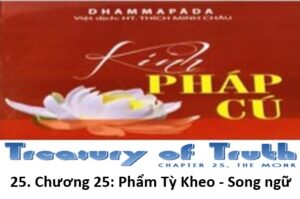
Chapter 25: Bhikkhu Vagga – The Monk (Verse 360-382)
25. Kinh Pháp Cú – Chương 25: Giảng Lược Phẩm Tỳ Kheo – Song ngữ
Verse 360. Sense Discipline
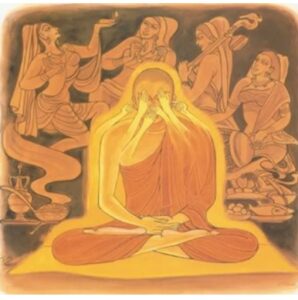
Right is restraint in the eye,
restraint in the ear is right,
right is restraint in the nose,
restraint in the tongue is right.
“Lành thay, phòng hộ mắt!
Lành thay, phòng hộ tai.
Lành thay, phòng hộ mũi,
Lành thay, phòng hộ lưỡi.”
Verse 361. Suffering End With All-Round Discipline
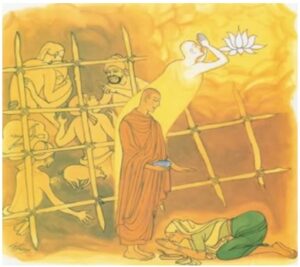
Right is restraint in the body,
restraint in speech is right,
right is restraint in the mind,
everywhere restraint is right.
The bhikkhu everywhere restrained
is from all dukkha free.
“Lành thay,phòng hộ thân!
Lành thay, phòng hộ lời,
Lành thay, phòng hộ ý.
Lành thay, phòng tất cả.
Tỷ kheo phòng tất cả.
Thoát được mọi khổ đau.”
Explanation:
360-361. Good is restraint over the eye; good is restraint over the ear; good is restraint over the nose; good is restraint over the tongue.
Good is restraint in the body; good is restraint in speech; good is restraint in thought. Restraint everywhere is good. The monk restrained in every way is freed from all suffering.
360-361. Chế phục được mắt, lành thay; chế phục được tai, lành thay; chế phục được mũi, lành thay; chế phục được lưỡi, lành thay; chế phục được thân, lành thay; chế phục được lời nói, lành thay; chế phục được tâm ý, lành thay; chế phục được hết thảy, thật lành thay. Tỳ kheo nào chế phục được hết thảy thì giải thoát hết thảy khổ.
Verse 362. The True Monk
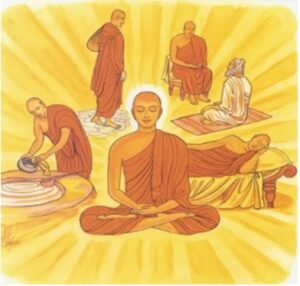
With hands controlled and feet controlled,
in speech as well as head controlled,
delighting in inward collectedness
alone, content, a bhikkhu’s called.
“Người chế ngự tay chân,
Chế ngự lời và đầu,
Vui thích nội thiền định.
Ðộc thân, biết vừa đủ,
Thật xứng gọi tỷ kheo.”
Explanation:
He who has control over his hands, feet and tongue; who is fully controlled, delights in inward development, is absorbed in meditation, keeps to himself and is contented – him do people call a monk.
- Gìn giữ tay chân và ngôn ngữ, gìn giữ cái đầu cao, tâm mến thích thiền định, riêng ở một mình và tự biết đầy đủ, ấy là bậc Tỳ kheo.
Verse 363. The Ideal Monk
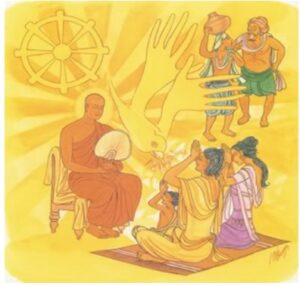
Whatever bhikkhu tongue-controlled
speaks wisely and who is not proud,
who theory and practice can expound,
sweet as honey is his speech.
“Tỷ kheo chế ngự miệng,
Vừa lời, không cống cao,
Khi trình bày pháp nghĩa,
Lời lẽ dịu ngọt ngào.”
Explanation:
That monk who has control over his tongue, is moderate in speech, unassuming and who explains the Teaching in both letter and spirit – whatever he says is pleasing.
- Tỳ kheo nào điều nhiếp được ngôn ngữ, khôn khéo và tịch tịnh, thì khi diễn bày pháp nghĩa, lời lẽ rất được hòa ái rõ ràng.
Verse 364. The Monk Abides in Dhamma
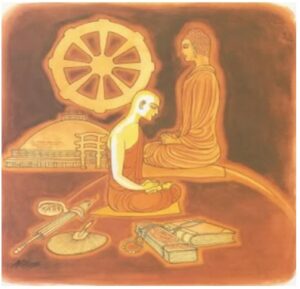
The bhikkhu who in Dhamma dwells,
in Dhamma delighting and pondering,
remembering the Dhamma – he
does not decline from Dhamma True.
“Vị tỷ kheo thích Pháp,
Mến pháp, suy tư Pháp.
Tâm tư niệm chánh Pháp,
Không rời bỏ chánh Pháp.”
Explanation:
The monk who abides in the Dhamma, delights in the Dhamma, meditates on the Dhamma and bears the Dhamma well in mind, he does not fall away from the sublime Dhamma.
- Tỳ kheo nào an trú trong lạc viên chánh pháp, mến pháp và theo pháp, tư duy nhớ tưởng pháp, thì sẽ không bị thối chuyển.
Verse 365. Accept What One Receives
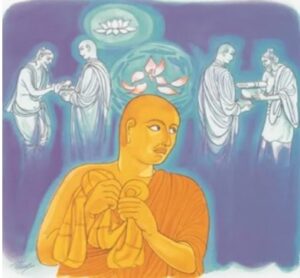
He should not disdain his gains
nor live of others envious,
the bhikkhu who is envious
does not attain collectedness.
“Không khinh điều mình được,
Không ganh người khác được
Tỷ kheo ganh tị người,
Không sao chứng Thiền Ðịnh.”
Explanation:
One should not despise what one has received, nor envy the gains of others. The monk who envies the gain of others does not attain to meditative absorption.
- Chớ nên khinh điều mình đã chứng, chớ hâm mộ điều người khác đã chứng, Tỳ kheo nào chỉ lo hâm mộ điều người khác tu chứng cuối cùng mình không được Tam ma địa (chánh định).
Verse 366. The Gods Adore Virtuous Monks
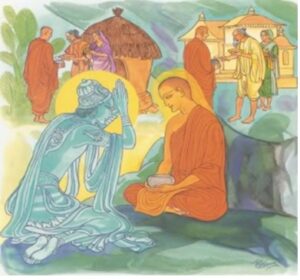
Disdaining not his gains,
though little he receives,
pure of life and keen
that bhikkhu devas praise.
“Tỷ kheo dầu được ít,
Không khinh điều mình được,
Sống thanh tịnh không nhác,
Chư thiên khen vị này.”
Explanation:
A monk who does not despise what he has received, even though it is little, who is pure in livelihood and unremitting in effort, him even the gods praise.
366. Hàng Tỳ kheo, dù được chút ít cũng không sinh tâm khinh hiềm, cứ sinh hoạt thanh tịnh và siêng năng, nên đáng được chư thiên khen ngợi.
Verse 367. He Is A Monk Who Has No Attachment
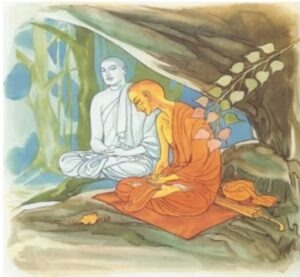
For whom there is no making ‘mine’
towards all name and form,
who does not grieve for what is not,
he’s truly ‘bhikkhu’ called.
“Hoàn toàn, đối danh sắc,
Không chấp Ta, của Ta.
Không chấp, không sầu não.
Thật xứng danh Tỷ kheo.”
Explanation:
He who has no attachment whatsoever for the mind and body, who does not grieve for what he has not – he is truly called a monk.
- Nếu đối với thân tâm mà không lầm chấp là “ta” hay “của ta”. Vì không ta và của ta nên không lo sợ. Người như vậy mới là Tỳ kheo.
Verse 368. The Monk Who Radiates Loving-Kindness Radiates Peace
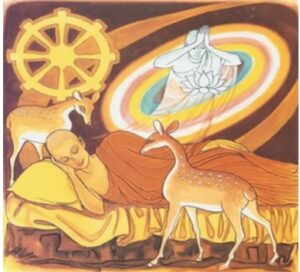
The bhikkhu in kindness abiding,
bright in the Buddha’s Teaching
can come to the Place of Peace,
the bliss of conditionedness ceased.
“Tỷ kheo trú từ bi,
Tín thành giáo Pháp Phật,
Chứng cảnh giới tịch tỉnh.
Các hạnh an tịnh lạc.”
Explanation:
The monk who abides in universal love and is deeply devoted to the Teaching of the Buddha attains the peace of Nibbana, the bliss of the cessation of all conditioned things.
- Hàng Tỳ kheo an trú trong tâm từ bi, vui thích giáo pháp Phật đà, sẽ đạt đến cảnh giới tịch tịnh an lạc, giải thoát các hành (vô thường).
Verse 369. Give Up Lust And Hatred
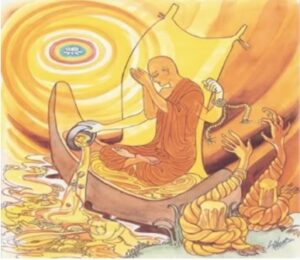
O bhikkhu bail this boat,
when emptied it will swiftly go.
Having severed lust and hate
thus to Nibbana you’ll go.
“Tỷ kheo, tát thuyền này,
Thuyền không, nhẹ đi mau.
Trừ tham, diệt sân hận,
Tất chứng đạt Niết-Bàn.”
Explanation:
Empty this boat, O monk! Emptied, it will sail lightly. Rid of lust and hatred, you shall reach Nibbana.
- Tỳ kheo múc nước trong chiếc thuyền nầy, hễ nước hết thì thuyền nhẹ và đi mau; đoạn trừ tham dục và sân nhuế trong thân nầy, hễ tham dục hết thì mau chứng Niết bàn.
Verse 370. Flood-Crosser Is One Who Has Given Up The Fetters
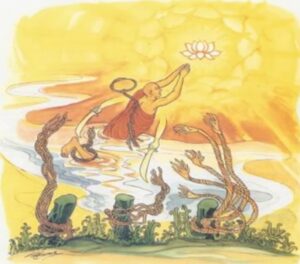
Five cut off and five forsake,
a further five then cultivate,
a bhikkhu from five fetter free
is called a ‘Forder of the flood.’
“Ðoạn năm (1), từ bỏ năm (2),
Tu tập năm (3) tối thượng,
Tỷ kheo cắt năm trói (4),
Xứng danh vượt “bộc lưu” (5).”
Explanation:
Cut off the five, abandon the five, and cultivate the five. The monk who has overcome the five bonds is called one who has crossed the flood.
- Tỳ kheo nào đoạn được năm điều, bỏ được năm điều, siêng tu năm điều, vượt khỏi năm điều say đắm, ta gọi người đã vượt qua giòng nước lũ.
Verse 371. Meditate Earnestly
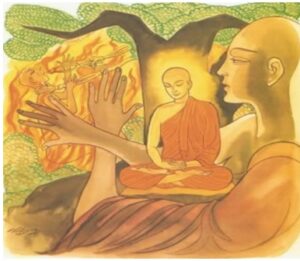
Meditate bhikkhu! Don’t be heedless!
Don’t let pleasures whirl the mind!
Heedless, do not gulp a glob of iron!
Bewail not when burning, ‘This is dukkha’!
“Tỷ kheo, hãy tu thiền,
Chớ buông lung phóng dật,
Tâm chớ đắm say dục,
Phóng dật, nuốt sắt nóng
Bị đốt, chớ than khổ!”
Explanation:
Meditate, O monk! Do not be heedless. Let not your mind whirl on sensual pleasures. Heedless, do not swallow a red hot iron ball, lest you cry when burning, “O this is painful!”
- Hãy tu định chớ buông lung, chớ mê hoặc theo dục ái. Đừng đợi đến khi nuốt hoàn sắt nóng, mới ăn năn than thở!
Verse 372. There Is No Wisdom In Those Who Do Not Think
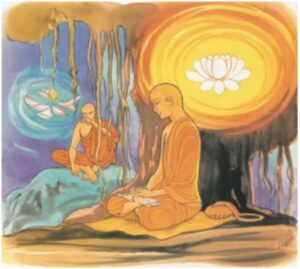
No concentration wisdom lacks,
no wisdom concentration lacks,
in whom are both these qualities
near to Nibbana is that one.
“Không trí tuệ, không thiền,
Không thiền, không trí tuệ.
Người có thiền có tuệ,
Nhất định gần Niết-Bàn.”
Explanation:
There is no meditative concentration for him who lacks insight, and no insight for him who lacks meditative concentration. He in whom are found both meditative concentration and insight, indeed, is close to Nibbana.
372. Không có trí tuệ, thì không có thiền định, không có thiền định, thì không có trí tuệ. Người nào gồm đủ thiền định và trí tuệ thì đã gần đến Niết bàn.
Verse 373. He Who Is Calm Experiences Transcendental Joy
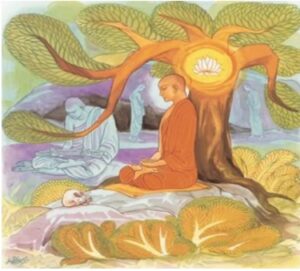
The bhikkhu gone to a lonely place
who is of peaceful heart
in-sees Dhamma rightly,
knows all-surpassing joy.
“Bước vào ngôi nhà trống,
Tỷ kheo tâm an tịnh,
Thọ hưởng vui siêu nhân
Tịnh quán theo chánh pháp.”
Explanation:
The monk who has retired to a solitary abode and calmed his mind, who comprehends the Dhamma with insight, in him there arises a delight that transcends all human delights.
- Tỳ kheo đi vào chỗ yên tĩnh thời tâm thường vắng lặng, quán xét theo chánh pháp thì được thọ hưởng cái vui siêu nhân.
Verse 374. He Is Happy Who Reflects On Rise And Fall
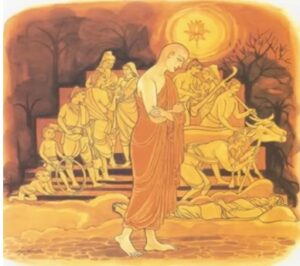
Whenever one reflects
on aggregates’ arise and fall
one rapture gains and joy.
‘Tis Deathless for Those-who-know.
“Người luôn luôn chánh niệm,
Sự sanh diệt các uẩn,
Ðược hoan hỷ, hân hoan,
Chỉ bậc bất tử biết.”
Explanation:
Whenever he sees with insight the rise and fall of aggregates, he is full of joy and happiness. To the discerning one this reflects the Deathless.
- Người nào thường nghĩ đến sự sanh diệt của các uẩn, thì sẽ được vui mừng hạnh phúc. Nên biết người đó không bị chết.
Verse 375. A Wise Monk Possess His Cardinal Virtues
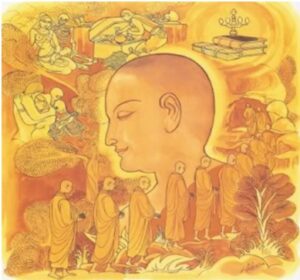
Here’s indeed the starting point
for the bhikkhu who is wise,
sense-controlled, contented too,
restrained to limit freedom ways,
in company of noble friends
who’re pure of life and keen.
“Ðây Tỷ kheo có trí,
Tụ tập pháp căn bản
Hộ căn, biết vừa đủ,
Giữ gìn căn bản giới,
Thường gần gũi bạn lành,
Sống thanh tịnh tinh cần.”
Explanation:
Control of the senses, contentment, restraint according to the code of monastic discipline – these form the basis of holy life here for the wise monk.
- Nếu là bậc Tỳ kheo sáng suốt, dù ở trong đời, trước tiên vẫn lo nhiếp hộ các căn và biết đủ, hộ trì giới luật.
Verse 376. A Monk Should Be Cordial In All His Ways
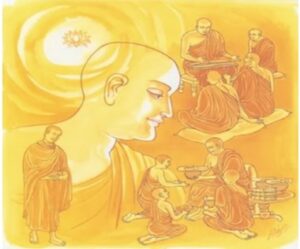
One should be hospitable
and skilled in good behaviour,
thereby greatly joyful
come to dukkha’s end.
“Giao thiệp khéo thân thiện,
Cử chỉ mực đoan trang.
Do vậy hưởng vui nhiều,
Sẽ dứt mọi khổ đau.”
Explanation:
Let him associate with friends who are noble, energetic and pure in life, let him be cordial and refined in conduct. Thus, full of joy, he will make an end of suffering.
- Thái độ thì phải thành khẩn, hành vi thì phải đoan chánh, được vậy, họ là người nhiều vui và sạch hết khổ não.
Verse 377. Cast Off Lust And Hatred
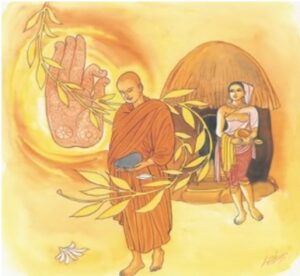
Just as the jasmine sheds
its shrivelled flowers all,
O bhikkhus so should you
lust, aversion shed.
“Như hoa Vassikà (6)
Quăng bỏ cánh úa tàn,
Cũng vậy vị Tỷ kheo,
Hãy giải thoát tham sân.”
Explanation:
Just as the jasmine creeper sheds its withered flowers, even so, O monks, should you totally shed lust and hatred!
- Cành hoa Bạt tất ca [11] bị úa tàn như thế nào, thì Tỳ kheo các ông, cũng làm cho tham sân úa tàn thế ấy.
Verse 378. He Is Peaceful Who Is Free From All Worldly Things
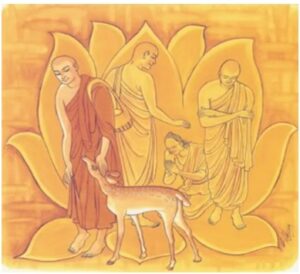
That bhikkhu calmed of body, speech,
calmed and well-composed of mind,
who world-enjoyments has renounced,
‘one calmed’ indeed is truly called.
“Thân tịnh, lời an tịnh,
An tịnh, khéo thiền tịnh.
Tỷ kheo bỏ thế vật,
Xứng danh “bậc tịch tịnh “.
Explanation:
The monk who is calm in body, calm in speech, calm in thought, well composed and who has spewn out worldliness – he, truly, is called serene.
378. Hàng Tỳ kheo mà thân giữ thanh tịnh, tâm an trú tam muội [12] xa lìa nơi dục lạc, ta gọi là người tịch tịnh.
Verse 379. He Who Guards Himself Lives Happily
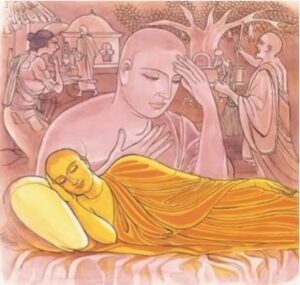
By yourself exhort yourself!
By yourself restrain yourself!
So mindful and self-guarded too,
happily, bhikkhu, will you live.
“Tự mình chỉ trích mình,
Tự mình dò xét mình,
Tỷ kheo tự phòng hộ
Chánh niệm, trú an lạc.”
Explanation:
By oneself one must censure oneself and scrutinize oneself. The self-guarded and mindful monk will always live in happiness.
- Các ngươi hãy tự cảnh sách, các ngươi hãy tự phản tỉnh! Tự hộ vệ và chánh niệm theo chánh pháp mới là Tỳ kheo an trụ trong an lạc.
Verse 380. You Are Your Own Saviour
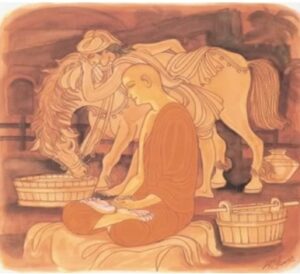
Oneself is refuge of oneself
and one is a haven for oneself,
therefore one should check oneself
as a merchant with a splendid horse.
“Tự mình y chỉ mình,
Tự mình đi đến mình,
Vậy hãy tự điều phục,
Như khách buôn ngựa hiền.”
Explanation:
One is one’s own protector, one is one’s own refuge. Therefore, one should control oneself, even as the trader controls a noble steed.
- Chính các ngươi là kẻ bảo hộ cho các ngươi, chính các ngươi là nơi nương náu cho các ngươi. Các ngươi hãy gắng điều phục lấy mình như thương khách lo điều phục con ngựa lành.
Verse 381. With Joy And Faith Try To Win Your Goal
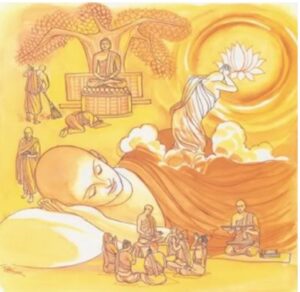
The bhikkhu full of joy and faith,
bright in the Buddha’s Teaching
can come to the Place of Peace,
the bliss of conditionedness ceased.
“Tỷ kheo nhiều hân hoan,
Tịnh tín giáo pháp Phật,
Chứng cảnh giới tịch tịnh,
Các hạnh an tịnh lạc.”
Explanation:
Full of joy, full of faith in the Teaching of the Buddha, the monk attains the Peaceful State, the bliss of cessation of conditioned things.
- Tỳ kheo nào đầy tâm hoan hỷ, thành tín theo giáo pháp Phật đà, sẽ đạt đến cảnh giới tịch tịnh an lạc, giải thoát các hành (vô thường).
Verse 382. Even A Young Monk, If Devoted, can Illuminate The Whole World
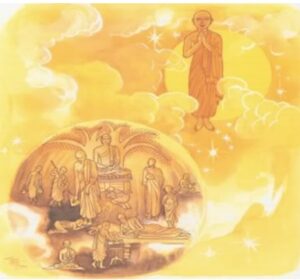
Surely that youthful bhikkhu who
strives in the Buddha’s Teaching
illuminates all this world
as moon when free from clouds.
“Tỷ kheo tuy tuổi nhỏ
Siêng tu giáo pháp Phật,
Soi sáng thế gian này,
Như trăng thoát khỏi mây.”
Explanation:
That monk who while young devotes himself to the Teaching of the Buddha illumines this world like the moon freed from the clouds.
- Những Tỳ kheo tuy tuổi nhỏ mà siêng tu đúng giáo pháp Phật đà, là ánh sáng chiếu soi thế gian, như mặt trăng ra khỏi mây mù.
Chú thích:(1) Thân kiến, nghi, giới cấm thủ, dục ái, sân.
(2) Sắc ái, vô sắc ái, mạn, trạo cử, vô minh.
(3) Tín, tấn, niệm, định, tuệ.
(4) 5 trói buộc: tham, sân, si, mạn, tà kiến
(5) Bộc lưu: dòng nước lũ
(6) Bông lài.
[11] Bạt tất ca: (Vassika), tên một thứ hoa thơm hơn cả các loài hoa khác.
[12] Tam muội: tiếng Phạn là Samadhi, xưa dịch âm là Tam muội, còn gọi là Tam ma đề, Tam ma đế. Trung Hoa dịch là chánh định hay chánh thọ. Chánh định là dừng mọi vọng tưởng không cho loạn động, nên gọi là định. Chánh thọ là không thọ tất cả pháp trần, giữ tâm yên lặng không tán loạn, gọi là chánh thọ.

Sources:
Tài liêu tham khảo:
- http://thanhtruc-thanhtrucgdth.blogspot.com/2011/02/kinh-phap-cu.html
- http://www.buddhanet.net/dhammapada/d_monks.htm
- http://www.neatorama.com/2007/03/02/bizarro-caption-contest/
- Tam Tu Metta Buddhist Temple & Heritage Garden – 610 Fisher Ave, Morgan Hill, CA 95037
- https://quangduc.com/a29849/kinh-phap-cu-chu-giai-tap-4
